Here is a 7-day Mediterranean diet meal plan. This plan emphasizes fruits, vegetables, whole grains, legumes, and lean proteins like fish.
Day 1
- Breakfast: Greek yogurt with honey and fresh berries
- Lunch: Quinoa salad with chickpeas, cucumbers, tomatoes, and feta
- Dinner: Grilled salmon with steamed broccoli and a side of brown rice
Day 2
- Breakfast: Oatmeal with sliced almonds, banana, and a drizzle of olive oil
- Lunch: Hummus and vegetable wrap with whole grain tortilla
- Dinner: Baked chicken with roasted vegetables (zucchini, bell peppers, onions)
Day 3
- Breakfast: Whole grain toast with avocado and poached eggs
- Lunch: Lentil soup with a side of mixed green salad
- Dinner: Shrimp and vegetable stir-fry with whole grain couscous
Day 4
- Breakfast: Smoothie with spinach, banana, almond milk, and chia seeds
- Lunch: Greek salad with olives, tomatoes, cucumber, and feta
- Dinner: Stuffed bell peppers with quinoa, black beans, and corn
Day 5
- Breakfast: Whole grain pancakes topped with fresh fruit
- Lunch: Tuna salad with mixed greens and a lemon vinaigrette
- Dinner: Baked cod with a side of sweet potato fries and steamed asparagus
Day 6
- Breakfast: Scrambled eggs with spinach and tomatoes
- Lunch: Falafel wrap with tzatziki and mixed vegetables
- Dinner: Vegetable and chickpea stew with whole grain bread
Day 7
- Breakfast: Greek yogurt parfait with granola and fresh berries
- Lunch: Caprese salad with tomatoes, mozzarella, basil, and balsamic reduction
- Dinner: Grilled lamb chops with a side of couscous and sautéed spinach
Sources
- eatingwell.com - 7-Day Mediterranean Diet Meal Plan: 1200 Calories
- goodhousekeeping.com - The Best 7-Day Mediterranean Diet Meal Plan for Beginners
- beyondthebrambleberry.com - 7 Day Mediterranean Diet Meal Plan for Beginners
- verywellfit.com - 7-Day Mediterranean Diet Meal Plan Ideas: Recipes & Prep
- diabetes.ca - 7-day Mediterranean healthy meal plan
- taste.com.au - Mediterranean diet 7-day meal plan
The Mediterranean diet is recognized for its myriad of health benefits and its emphasis on plant-based foods, heart-healthy fats like olive oil, fish, and whole grains. This eating pattern, inspired by the traditional dietary habits of countries bordering the Mediterranean Sea, is not only beneficial for cardiovascular health but also supports a diverse and balanced approach to daily meal planning. Unlike many restrictive diets, the Mediterranean diet offers a sustainable lifestyle change that encourages enjoying meals with family and cultural tradition, which contributes to its long-term success and popularity.
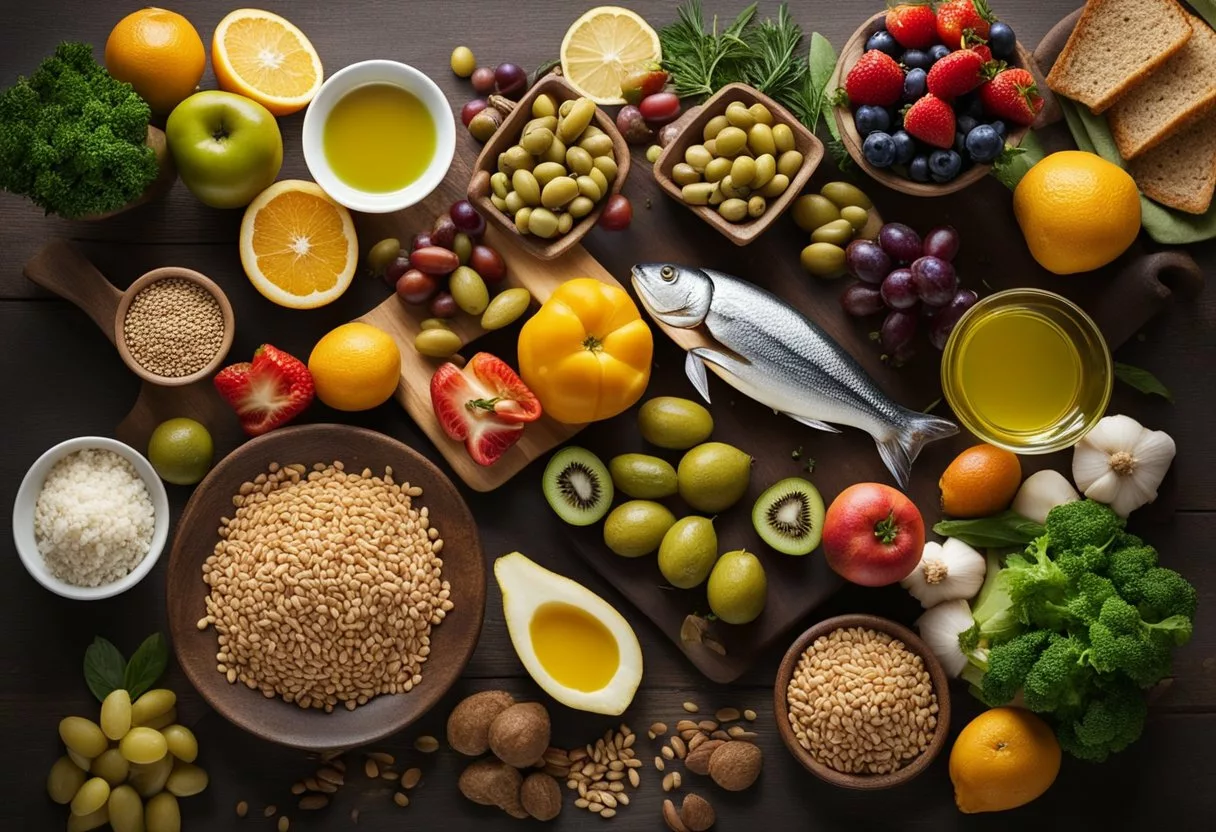
Fundamental to the Mediterranean diet meal plan is its flexibility and variety, which can easily be tailored to individual preferences and nutritional needs. Breakfast might include Greek yogurt with fruits and nuts, lunch could be a wholesome salad with legumes and a side of whole-grain bread, while dinner focuses on lean proteins and an assortment of vegetables. Snacking is not off-limits; it promotes wholesome options like fruits, nuts, or small portions of cheese. Moreover, the diet’s emphasis on minimally processed foods and fresh ingredients necessitates mindful shopping and an understanding of food labeling, which is an integral part of the approach.
Key Takeaways
- Embraces a variety of fresh, nutrient-dense foods for balanced daily meals.
- Encourages heart health and can be easily adapted to suit individual tastes and needs.
- Supports a lifestyle of mindful eating and appreciation for cultural food traditions.
Benefits of the Mediterranean Diet
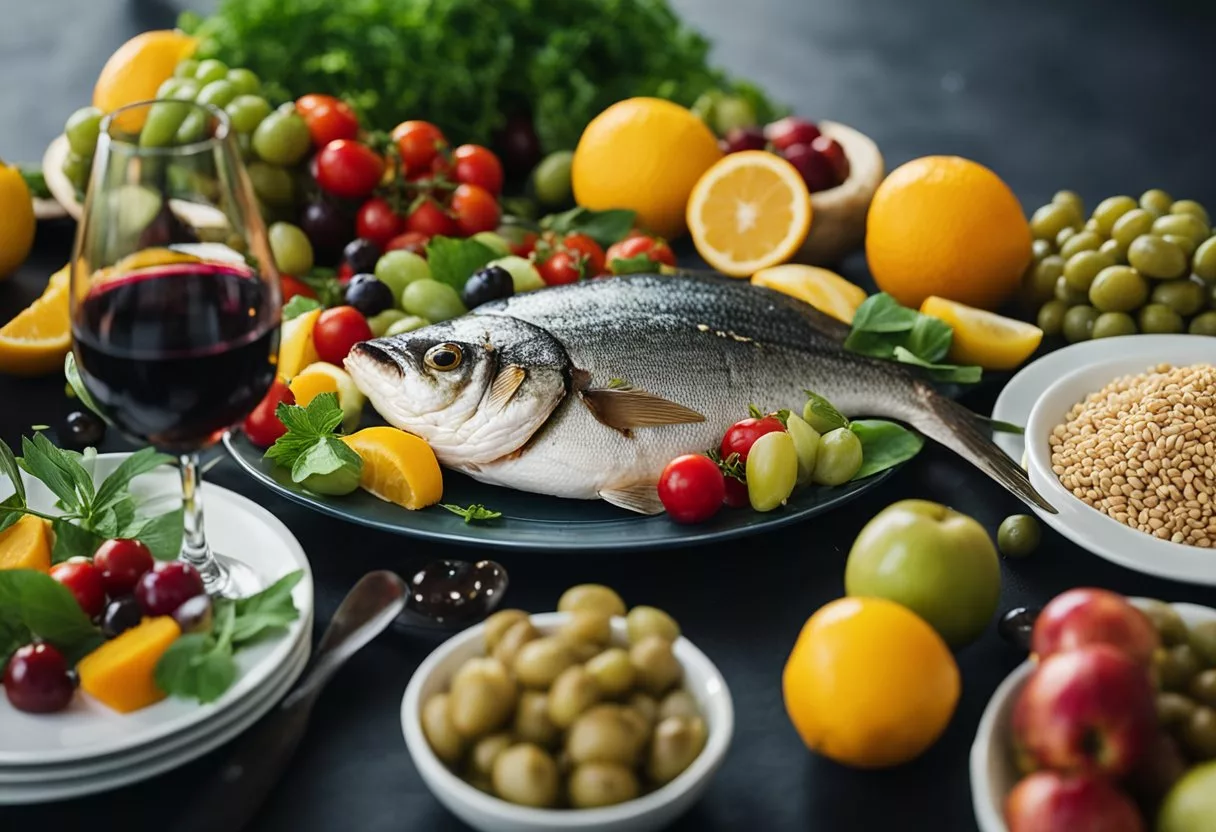
The Mediterranean Diet emphasizes nutritious whole foods and heart-healthy fats that are shown to provide various health benefits. The diet is known for reducing the risk of chronic illnesses and aiding in weight management.
Heart Health
The Mediterranean diet is renowned for its cardiovascular benefits. Key components like high amounts of fresh fruits, vegetables, whole grains, and especially the inclusion of olive oil contribute to lowering cholesterol and blood pressure. Replacing saturated fats with healthier fats like those found in olive oil is linked to a reduced risk of heart disease.
Weight Loss and Management
Adopting the Mediterranean lifestyle can lead to a sustainable weight loss. This diet is rich in fiber, which helps in keeping the stomach full and aids in managing calories effectively. Regular physical activity, as part of the lifestyle, further supports weight management efforts. Unlike extreme diets, it focuses on long-term habits that promote steady and healthy weight loss.
Disease Prevention
Research has indicated that the Mediterranean diet may lower the risk of various diseases. It is associated with a reduced incidence of type 2 diabetes, by improving insulin sensitivity. Additionally, the diet’s emphasis on plant-based foods and healthy fats could contribute to cancer prevention. It promotes a balanced diet and a healthy lifestyle, which together play a significant role in disease prevention.
Fundamentals of Meal Planning
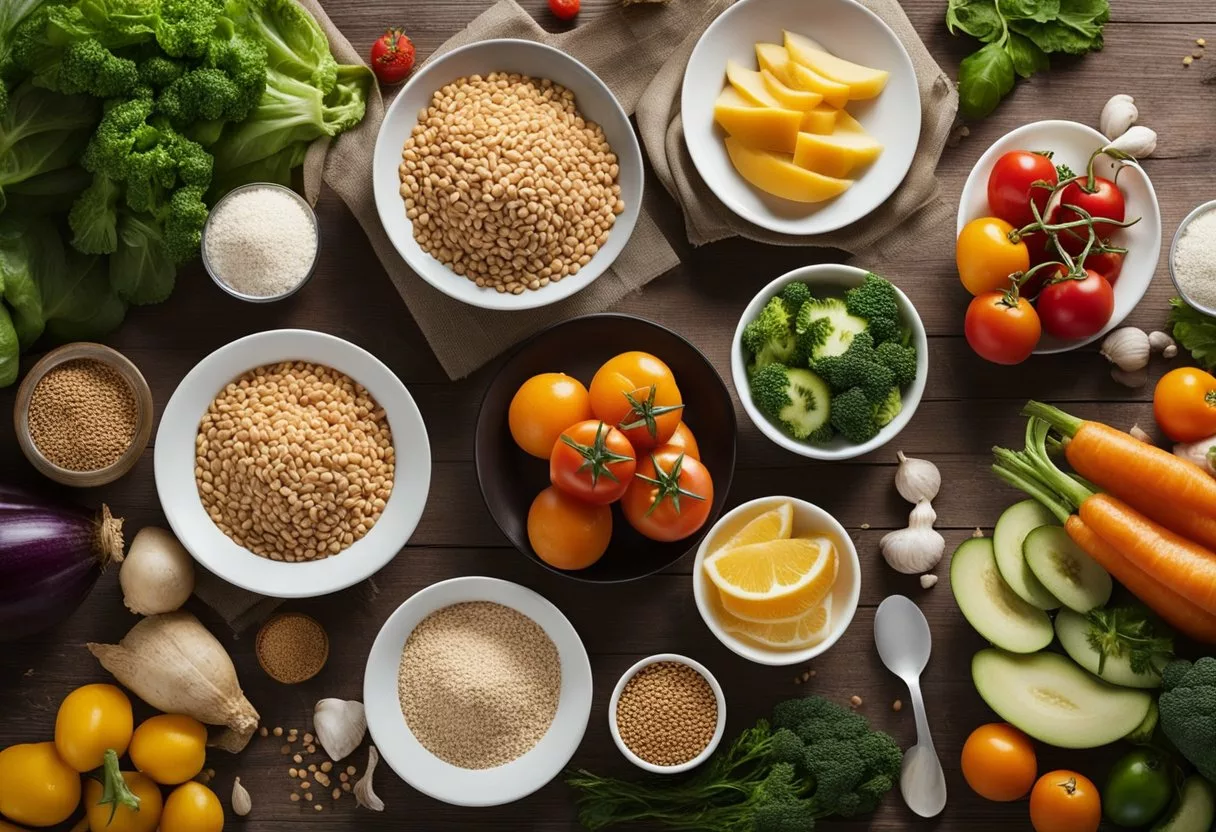
Proper meal planning is essential when adopting a Mediterranean diet. It ensures balanced nutrition through a diverse range of healthful foods and helps streamline the meal preparation process.
Understanding Nutritional Needs
The Mediterranean diet emphasizes the consumption of protein, healthy fats, fiber, and a balanced number of calories. Proteins can be obtained from sources like fish and legumes, while healthy fats come from olive oil, nuts, and seeds. High-fiber foods include whole grains, fruits, and vegetables. A well-crafted meal plan should balance these nutrients to support overall health.
- Protein: Fish, poultry, legumes
- Healthy Fats: Olive oil, avocados, nuts
- Fiber: Fruits, vegetables, whole grains
- Calories: Mindful balancing to meet energy needs
Incorporating Variety
Variety is key to enjoying the Mediterranean diet and reaping its health benefits. A rotating selection of fruits, vegetables, whole grains, and proteins keeps meals exciting and nutritionally complete. Seeds and legumes play a significant role in adding diversity to dishes, often incorporated into salads, soups, and stews.
- Vegetables: Unlimited options, focus on leafy greens
- Fruits: Seasonal variety, minimal processing
- Whole Grains: Bread, pasta, rice — whole and minimally processed
- Proteins: Primarily from fish and plant-based sources
Strategies for Meal Prep
Meal prep on a Mediterranean diet involves advance preparation of ingredients to simplify cooking during the week. Key strategies include:
- Batch Cooking: Prepare staples like whole grains and legumes in large quantities.
- Ingredient Prepping: Wash and chop vegetables and fruits for easy access.
- Flexible Recipes: Choose recipes that can easily swap ingredients to accommodate what’s on hand.
- Portioning and Storing: Create individual meal components that can be mixed and matched.
Meal prepping not only saves time but ensures adherence to the diet. Utilization of a meal plan with tailored recipes promotes a structured approach to eating while allowing for personal preference and seasonal availability.
Breakfast Options

The Mediterranean diet emphasizes a diverse intake of nutrient-rich foods for the first meal of the day. There are a variety of breakfast choices that align with this eating pattern, focusing on whole grains, healthy fats, and lean proteins.
Energizing Starters
For an energizing start, one can opt for oatmeal or quinoa, both whole grains, as the base of the breakfast. To add texture and flavor, incorporating berries or other fruit provides natural sweetness and a boost of vitamins. A drizzle of honey and a sprinkle of nuts add both energy and crunch.
- Oatmeal Bowl: Oatmeal with a topping of mixed berries, slivered almonds, and a hint of cinnamon.
- Quinoa Fruit Salad: Cooked quinoa mixed with diced fruits and a squeeze of fresh lemon juice.
Protein-Rich Breakfasts
Protein is essential for a filling breakfast, and the Mediterranean diet provides this through sources such as eggs and Greek yogurt. Eggs can be prepared in numerous ways, such as in an omelet with greens like spinach or kale. Plain Greek yogurt can be a delicious base for a protein-packed bowl.
- Spinach Omelet: Eggs whisked and cooked with fresh spinach, tomatoes, and feta cheese.
- Greek Yogurt Parfait: Layered plain Greek yogurt with granola, nuts, and fresh fruit.
Quick and Healthy Choices
When time is short, quick yet healthy options are still plentiful. Whole-grain bread provides a speedy foundation for toasts and sandwiches. Toppings like avocado and legumes can enhance the nutritional content. Grab-and-go choices like fruit or a handful of nuts are also sensible.
- Avocado Toast: Whole-grain toast topped with smashed avocado, a sprinkle of sesame seeds, and a dash of lemon.
- Bean Spread Sandwich: Whole-grain bread with a spread made from pureed legumes, a slice of tomato, and a leaf of lettuce.
By incorporating these foods into their breakfast routine, individuals following the Mediterranean diet can enjoy meals that are not only flavorful and satisfying but also contribute to their overall well-being.
Lunch Ideas
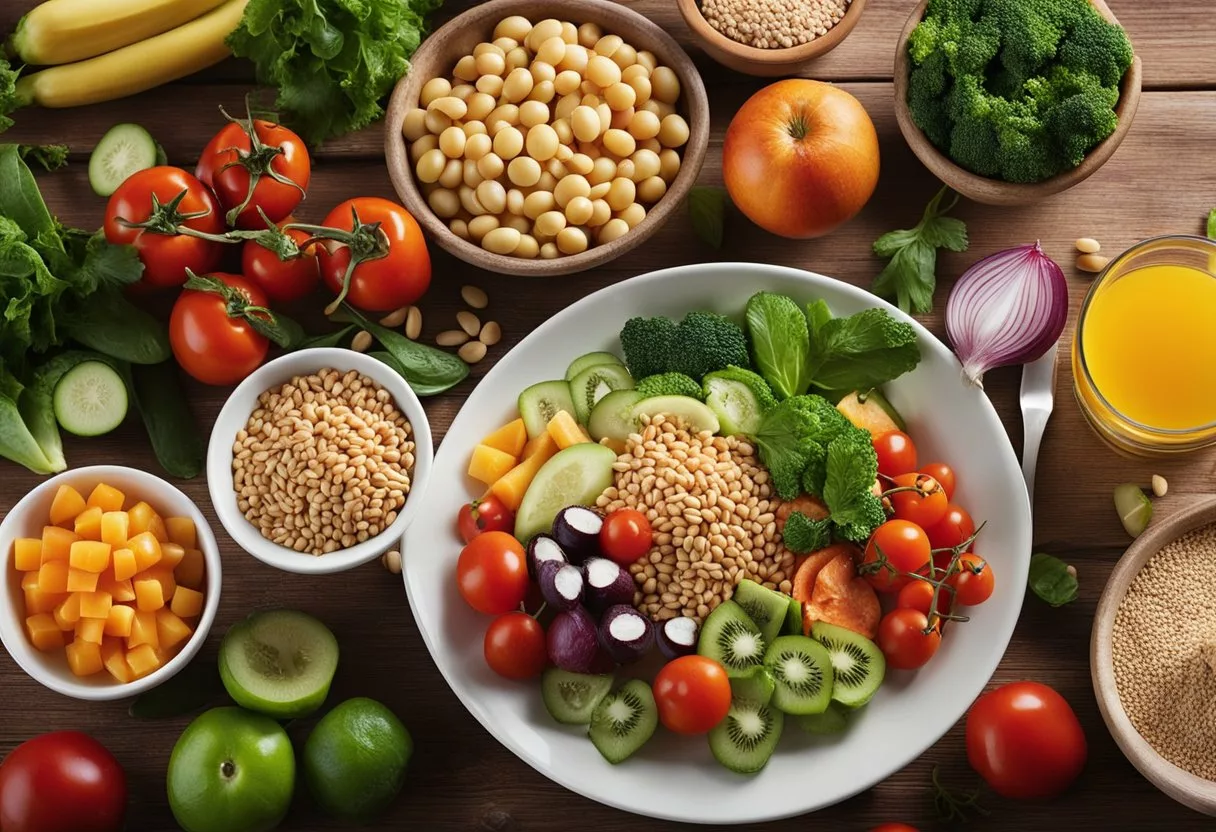
Lunch on the Mediterranean Diet can be both a nourishing and delicious part of one’s daily eating routine, often incorporating a variety of vegetables, whole grains, and lean proteins.
Salads and Bowls
One can enjoy a refreshing Lentil Salad tossed with spinach, tomatoes, cucumbers, and olives, packed with fiber and protein from the lentils and chickpeas. Bowls like the Mediterranean Chickpea Quinoa Bowl are another excellent option, giving a balance of plant-based protein from quinoa and chickpeas—perfect for a filling and energy-boosting midday meal.
Hearty Sandwiches and Wraps
For those preferring a handheld option, Hearty Sandwiches made with whole-grain bread, layered with roasted vegetables, and lean meats such as chicken or turkey are a great choice. Alternatively, Mediterranean Lettuce Wraps filled with a blend of beans, peas, and a hint of garlic offer a low-carb, satisfying lunch option.
Soup and Stew Recipes
Soups and stews are ideal for meal-prepping and can be filled with a range of Mediterranean Diet-friendly ingredients. A savory Tomato and Chickpea Soup with a base of garlic and tomatoes, peppered with spinach and other vegetables, not only provides a comforting meal but also supports a healthy diet with its nutrient-rich profile.
Dinner Recipes
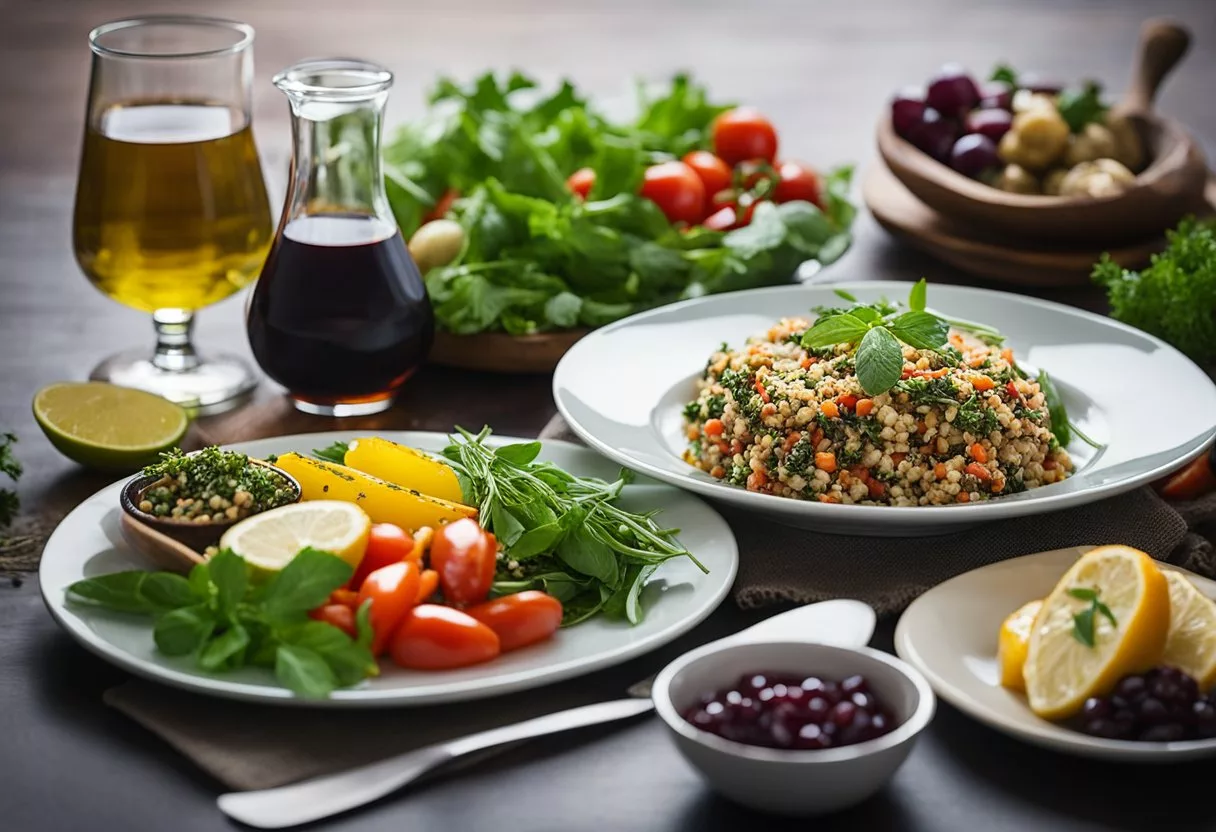
In the Mediterranean diet, dinner is a delightful showcase of balance and nourishment, featuring an array of vegetables, lean proteins such as fish and poultry, and hearty legumes. Often, dinners include both a main course and varied side dishes to provide a comprehensive meal reflective of the diet’s values.
Main Course Selections
For the main course, the Mediterranean diet encourages a high intake of seafood. One could prepare dishes like Grilled Salmon with Lemon and Herbs or Baked Trout with Olives and Tomatoes. These fish selections are not only rich in omega-3 fatty acids but also embody the diet’s principle of incorporating natural and minimally processed foods.
For those who prefer meat, options such as Grilled Chicken Breast with Rosemary and Garlic or Roasted Turkey marinated in Mediterranean herbs align with the diet’s guidelines by emphasizing lean proteins. While red meat is less common in this diet, one can occasionally enjoy meals like Lamb Chops with Thyme in moderation.
Vegetarian and Vegan Options
Vegetarians and vegans can find solace in the rich variety of plant-based dishes. A dish such as Stuffed Bell Peppers with Quinoa and Chickpeas utilizes legumes as a protein substitute. Another delightful option is Baked Eggplant with Tomato and Basil Sauce, which puts forward the flavors and nutritional benefits of vegetables.
Tofu, when prepared with a medley of Mediterranean spices like oregano and cumin, can also be an excellent protein-rich alternative for vegan main courses. Pairing tofu with sides like Kale Salad with Lemon Vinaigrette can transform it into a satisfying vegan dinner.
Side Dishes
Side dishes in the Mediterranean diet spotlight vegetables and legumes in flavorful and wholesome ways. A table might feature Roasted Sweet Potatoes with a sprinkle of paprika, or steamed Broccoli adorned with a light drizzle of extra virgin olive oil and a squeeze of fresh lemon juice.
A common and fiber-rich legume side dish is Lentil Salad with Cucumber and Mint. Salads often form an integral part of Mediterranean meals, with dishes such as Kale and Olive Salad offering a nutritious and tasty complement to any main course.
Snacks and Desserts
In aligning with the Mediterranean diet, snacks and desserts are selected for their nutritional value and adherence to principles of eating whole foods rich in healthy fats, fibers, and natural sugars. Portion control is key, as is the preference for fresh and wholesome ingredients.
Healthy Snacking
One can enjoy a variety of snacks on the Mediterranean diet that are both nutritious and satisfying. A small handful of unsalted nuts—such as almonds, walnuts, or pistachios—or seeds like pumpkin or sunflower seeds, provides a good balance of fiber, protein, and healthy fats.
Fruit makes an excellent snack option as well. Fresh peaches, apples, pears, and any kind of berries are not only refreshing but are packed with vitamins and antioxidants. Paired with yogurt or a slice of cheese, they provide a well-rounded snack.
- Example Snacks:
- A peach sliced and served with a dollop of yogurt
- Slices of apple or pear with a sprinkle of cinnamon
Sweet Treats
Desserts on the Mediterranean diet focus on natural sweetness and often incorporate fruits. A slice of gluten-free lemon cake made with almond flour and polenta can satisfy one’s sweet tooth without straying from dietary guidelines. Desserts tend to be fruit-based, and the use of refined sugars is minimal.
- Example Desserts:
- Sticky Gluten-Free Lemon Cake
- Fig with a drizzle of honey
Beverages
Beverages in the Mediterranean diet primarily include water and tea, both excellent choices for staying hydrated. While the diet allows for moderate consumption of red wine, which can be part of a dessert experience, it emphasizes the importance of water intake throughout the day.
- Beverage Options:
- Always prefer water for optimal hydration.
- Enjoy a cup of herbal tea as a soothing, calorie-free treat.
Shopping and Pantry Staples
When adopting a Mediterranean diet meal plan, one’s shopping list should focus on fresh, whole foods and high-quality ingredients that underpin this healthy lifestyle.
Must-Have Ingredients
Whole Foods and Healthy Fats:
- Extra-virgin olive oil: Look for high-quality, first-press oils.
- Fresh or dried herbs: Include varieties like basil, oregano, and rosemary.
- Garlic and lemon juice: Essential for flavoring dishes while keeping them light and healthy.
Vegetables and Fruits:
- A variety of vegetables: Leafy greens, bell peppers, and eggplants.
- Fruits for snacking and flavoring: Focus on berries, apples, and citrus fruits like oranges.
Dairy and Plant-Based Proteins:
- Nonfat Greek yogurt: Rich in protein and versatile for meals or snacks.
- Legumes: Lentils, chickpeas, and beans for plant-based protein.
Sourcing Fresh Produce
Vegetables and fruits should be the cornerstone of the Mediterranean diet.
- Seasonal and Local: Purchase seasonal produce from local markets when possible.
- Organic Options: Opt for organic to reduce exposure to pesticides.
Selecting Quality Proteins
High-quality proteins are another key element of the diet.
Seafood:
- Fatty fish: Salmon and tuna are rich in omega-3 fatty acids.
- Shellfish: Shrimp and other shellfish provide lean protein and important nutrients.
Poultry and Eggs:
- Free-range, organic poultry and eggs offer healthier alternatives to red meat.
Remember, balance is key in a Mediterranean diet, with a focus on variety and whole foods.
Understanding Labeling and Portion Sizes
When adopting a Mediterranean meal plan, accurately interpreting food labels and managing portion sizes are essential to maintaining a healthy diet. The reader will learn to identify nutrition facts relevant to this diet and to modulate food servings for optimal health.
Decoding Nutritional Information
One reads food labels to ensure they align with the principles of the Mediterranean diet, which emphasizes whole grains, legume protein, fiber, and healthy fats. For example, they would look for:
- Calories: Essential for energy, but awareness of total caloric intake is necessary to avoid overconsumption.
- Protein: Indicator of the amount of lean protein, like fish or poultry.
- Fiber: The grams of dietary fiber such as those found in whole grains and legumes; this diet favors high fiber intake.
- Sugar: Lower amounts are preferable; the Mediterranean diet focuses on natural sugars from fruit rather than added sugars.
- Salt: It is advisable to opt for items with lower sodium to reduce the risk of hypertension.
- Fat: Differentiating between saturated and unsaturated fats is crucial; the Mediterranean diet promotes healthy fats like olive oil over saturated fats in red meat and dairy.
By understanding these components, individuals can make educated decisions about the foods to include in their meal plans, aiming for natural, minimally processed options.
Portion Control
Precisely managing portion sizes ensures that one remains in line with the Mediterranean diet’s emphasis on moderation, particularly concerning dairy, red meat, and processed foods. Suggested portion sizes might be:
- Dairy: 1-2 servings per day (serving sizes: 1 cup of milk or yogurt, 1.5 ounces of cheese).
- Red meat: Limited to a few times a month, with portions about the size of a deck of cards.
- Processed foods: Minimum intake. If they must be consumed, one checks labels to avoid high levels of sugar, salt, and unhealthy fats.
For most meals, half the plate should be composed of vegetables and fruits, a quarter of whole grains, and the remaining quarter of lean proteins, with a modest addition of healthy fats.
By focusing on nutritious, adequately portioned food selections, the Mediterranean diet can contribute significantly to one’s health, from improved heart function to better blood sugar regulation.
Cultural Aspects and Traditions
The Mediterranean diet is deeply rooted in the rich heritage of countries bordering the Mediterranean Sea, where traditional practices and local ingredients form the cornerstone of its cuisine.
Historical Mediterranean Cuisine
The historical aspects of Mediterranean cuisine are characterized by a reliance on a diverse range of farm-fresh and sea-fresh foods. Olive oil holds a place of honor, used both for cooking and as a condiment in countries like Greece and Italy. Seafood consumption varies by coastal proximity but remains a vital source of nutrients across the Mediterranean basin. Staple foods, such as legumes and pasta, have been consumed for millennia, often garnished with pesto or hummus. Feta cheese, another regional specialty, provides a tangy addition to many Mediterranean dishes. Such dietary habits not only reflect the traditional lifestyle but also contribute to the renowned health benefits attributed to the Mediterranean diet.
Incorporating Cultural Recipes
Adopting the Mediterranean diet does not imply renouncing cultural identity, as key ingredients like healthy fats, legumes, and olive oil are versatile and can be incorporated into various global cuisines. For instance, blending olive oil into traditional spreads like pesto or hummus maintains the dietary philosophy while allowing for cultural customization. Seafood, enjoyed throughout Mediterranean regions, can be adapted to local preferences, whether it be through spice levels or preparation methods. In essence, integrating the wholesome substances of the Mediterranean palette can enrich cultural recipes without compromising their core nutritional values.
Frequently Asked Questions
The Mediterranean diet is a well-studied and highly regarded eating plan recognized for its health benefits. This section answers common questions about its fundamentals, initiation, meal options, and health contributions.
What are the core components of a Mediterranean diet?
The Mediterranean diet’s core components include a high consumption of fruits, vegetables, whole grains, and legumes. Lean proteins, particularly fish, are favored, along with nuts and seeds. Olive oil is the main source of dietary fat instead of butter or lard.
How can someone get started with a Mediterranean diet meal plan?
To start a Mediterranean diet meal plan, individuals should gradually increase their intake of fruits, vegetables, whole grains, and legumes. Incorporating more seafood into meals while reducing red meat consumption is also recommended. Swapping refined oils with olive oil is a foundational step.
What are some typical breakfast options in a Mediterranean diet?
A Mediterranean diet breakfast might consist of Greek yogurt with honey and fruits, whole-grain toast with olive oil and tomato, or oatmeal with nuts. Ingredients are fresh and minimally processed.
Can you suggest a sample menu for a week on the Mediterranean diet?
A sample menu could include a variety of dishes such as grilled fish with quinoa and roasted vegetables, lentil soup with a side of whole-grain bread, and eggplant parmesan. Each meal should prioritize plant-based foods and incorporate healthy fats and lean proteins.
How does a Mediterranean diet contribute to weight loss and health?
A Mediterranean diet supports weight loss by emphasizing foods high in fiber, which help in feeling full and satisfied. The diet is also rich in healthy fats and lean proteins that can aid in maintaining muscle mass while losing fat. Additionally, it promotes overall health by reducing the risk of heart disease and metabolic complications.
Where can I find a shopping list to begin a Mediterranean diet?
A shopping list for a Mediterranean diet would include items like fresh produce, whole-grain pasta and bread, legumes like lentils and chickpeas, seafood, nuts, seeds, and olive oil. Many recipes or meal plans include a detailed shopping list to help individuals purchase the right ingredients.
